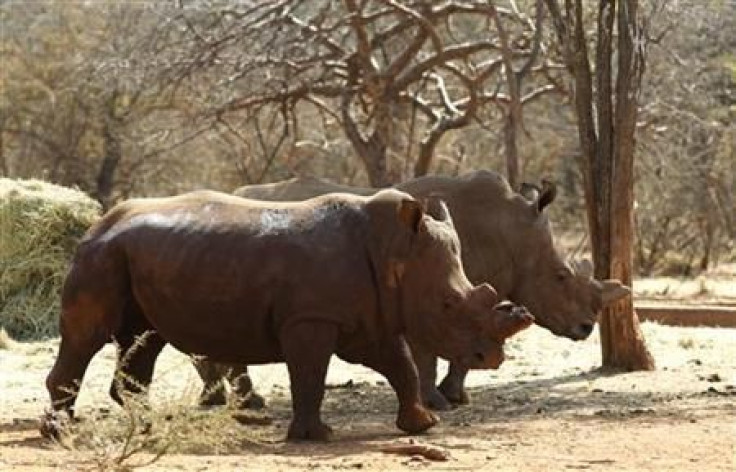Rhinos Poached To Extinction In Mozambique Park

The rhinoceros has been hunted to extinction in Mozambique’s Limpopo National Park, according to reports.
Park officials have revealed that they have not seen any rhinos since January, suggesting that the last few animals were killed off by poachers, allegedly in collusion with some corrupt park rangers, according to travel blog Gadling.
Since virtually all rhinos in southern Africa have been found in wildlife sanctuaries, it is reasonable to assume that none of the beasts will be found anywhere else in Mozambique.
Across Africa, rhinos have been slaughtered by hunters who sell their horns to black markets in east Asia, primarily China and Vietnam.
The horns, Gadling notes, are highly prized for their alleged medicinal properties.
Rhinos are now on the brink of total extinction.
António Abacar, the Park's director, further warned that, with the rhinos gone, poachers may next turn their attention to the park’s elephants, which are already an endangered species.
“Our greatest problem is that some of our workers are involved in poaching,” Abacar told reporters, according to Portugal News Online.
Abacar also said that some 30 park employees will face charges in connection with the killings of the rhinos.
The Limpopo Park is part of the Great Limpopo Transfrontier Park, which also comprises Kruger National Park in South Africa and Gonarezhou National Park in Zimbabwe. This multinational sanctuary was formed in 2002, with all three countries agreeing to remove borders to allow the animals to graze and migrate freely.
The conservation area was then praised as "the world's greatest animal kingdom.”
At that time, Limpopo boasted more than 1,000 elephants and 300 rhinos. By the beginning of 2013, there were only about 15 rhinos remaining.
Portugal News Online reported that South African officials have sought to stamp out poaching by threatening to reconstruct fences along its borders with Mozambique. Over the past five years, South African police and army officers have killed 279 Mozambicans poachers and arrested at least another 300.
In the Kruger Park, some 180 rhinos have been killed so far this year, the Daily Telegraph reports. In 2013, 668 rhinos were slaughtered, a 50 percent increase over the prior year.
“It is tragic beyond tears that we learn game rangers have now become the enemy in the fight to protect rhinos from being poached for their horns,” Kelvin Alie, director of the International Fund for Animal Welfare’s Wildlife Crime and Consumer Awareness Program, said in a statement.
“That the entire rhino population of part of such an important conservation initiative can be wiped out -- and with the help of wildlife enforcement officers -- speaks volumes about the deadly intent of the wildlife trade. They will stop at nothing to get to their quarry.”
Dr. Jo Shaw, from the World Wide Fund for Nature, or WWFN, said the rhinos that were killed this year in Limpopo probably crossed into Mozambique from Kruger in South Africa, citing that the laws for killing a rhino are much laxer in Mozambique than in South Africa.
"Rhinos being killed in Kruger are mostly by Mozambican poachers who then move the horns out through their airports and seaports," she said. "With huge governance and corruption issues in Mozambique, it's a huge challenge."
WWFN also said that 150 years ago there were more than 1 million black and white rhinos spread out across Africans plains.
“Relentless hunting by European settlers saw rhino numbers and distribution quickly decline,” the group stated. “Poaching escalated during the 1970s and 1980s as demand grew for rhino horn, a prized ingredient in traditional Asian medicines and valued for dagger handles in the Middle East.”
© Copyright IBTimes 2024. All rights reserved.











